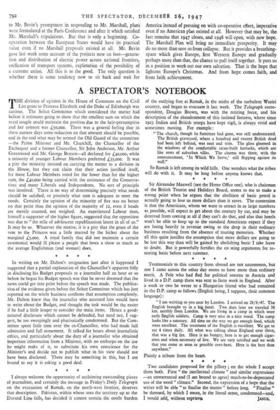A SPECTATOR'S NOTEBOOK
THE division of opinion in the House of Commons on the Civil List grant to Princess Elizabeth and the Duke of Edinburgh was curious. The Select Committee which considered the matter had before it estimates going to show that the smallest sum on which the royal couple could maintain the position due to the heir-presumptive and her consort was £50,000. There was a general feeling that in these austere days some reduction on that amount should be possible, and in the end what may be termed the Old Guard of the committee —the Prime Minister and Mr. Churchill, the Chancellor of the Exchequer and a former Chancellor, Sir John Anderson, Mr. Arthur Greenwood and Mr. George Benson—all declared for £4o,000, while a minority of younger Labour Members preferred £35,000. It was a pity the minority insisted on carrying the matter to a division in the House, but they can claim that their action justified itself, for more Labour Members voted for the lower than for the higher sum, the £40,000 being carried with the assistance of the Conserva- tives and many Liberals and Independents. No sort of principle was involved. There is no way of determining precisely what needs should be satisfied, or precisely what sum is adequate to meet the needs. Certainly the opinion of the minority of five was no better on that point than the opinion of the majority of 12, even if heads are merely counted, not weighed. An experienced Labour man, himself a supporter of the higher figure, suggested that the opposition was due to "the relic of adolescent republicanism latent in all of us." It may be so. Whatever the motive, it is a pity that the grace of the vote to the Princess was a little marred by the bicker about the marginal £5,000. A royal family that did not maintain a certain ceremonial would ill please a people that loves a show as much as the average Englishman (and woman) does.






























 Previous page
Previous page